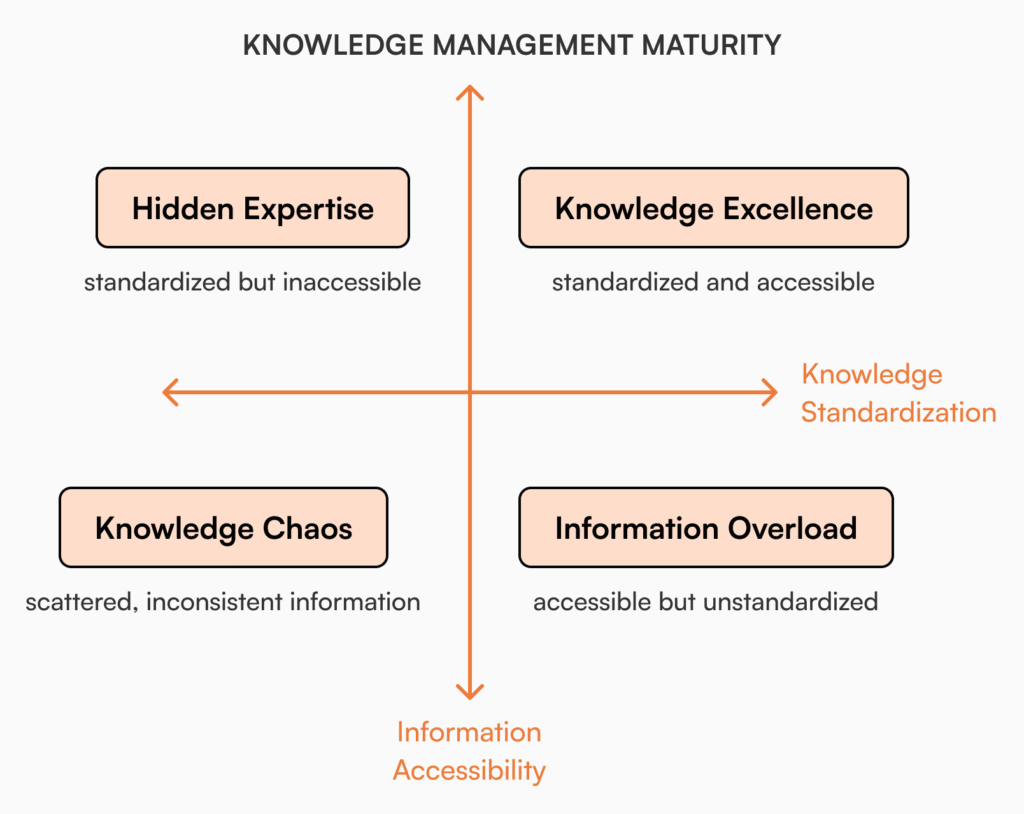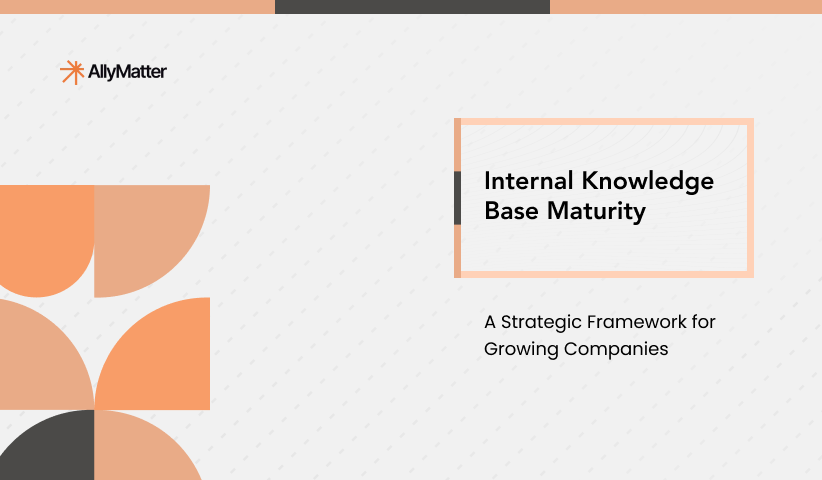You know the scenario: Your team needs to launch a campaign quickly, but the market research from last quarter is nowhere to be found. Or perhaps your best analyst just left, taking years of institutional knowledge with them. These situations aren’t just frustrating. They’re costly.
Knowledge management might not be the most exciting topic for marketing professionals, but it’s increasingly becoming a competitive differentiator. In an environment where market insights drive strategic decisions, how you organize, access, and leverage your collective intelligence directly impacts your marketing effectiveness.
This guide explores how proper knowledge management can transform scattered marketing insights into a strategic asset that drives more consistent, data-driven campaigns.
Impact of disorganized marketing information
Marketing teams create tremendous value through their research, analysis, and campaign execution. However, much of this value evaporates when knowledge isn’t properly captured and shared.
Knowledge workers spend a significant part of their workday searching for information. For marketing teams, this translates to significant opportunity costs. When market analysts can’t quickly access previous research, campaign data, or competitive insights, several problems emerge:
Duplicate research expenditures: A study by McKinsey found that employees spend 19% of their time searching for information or tracking down colleagues who can help with specific tasks. This often leads to repeating work that has already been done because previous findings weren’t accessible.

Inconsistent campaign execution: Without access to previous campaign learnings, teams risk repeating past mistakes or failing to build on previous successes. This creates a disjointed customer experience and diminished campaign effectiveness.
Slower time-to-market: Waiting to get information from colleagues can lead to unnecessary delays. For marketing teams under tight deadlines, these delays can mean missed opportunities.
Loss of competitive intelligence: Marketing teams gather valuable competitive intelligence that often lives in siloed spreadsheets or individual inboxes. According to Forrester, 74% of firms say they want to be “data-driven,” but only 29% are successful at connecting analytics to action.
The common thread in these challenges? Information exists within your organization but remains inaccessible precisely when it’s needed most.
Essential elements of marketing knowledge management
Creating an effective marketing knowledge ecosystem requires more than just implementing a new technology platform. It requires thoughtful consideration of how information should be organized and shared. Here are the key components:
Centralized research repository: Marketing research represents a significant investment. A central repository ensures that market analyses, survey results, and customer insights remain accessible long after the original researchers have moved on to other projects. This single source of truth eliminates confusion about which version of research is most current.
Campaign documentation standards: Establishing consistent documentation practices creates a valuable archive of campaign performance. This includes standardizing how teams document creative briefs, campaign objectives, targeting parameters, performance metrics, and post-campaign analyses. This standardization makes it easier to compare campaigns over time and extract meaningful insights.
Competitive intelligence organization: Market analysis often includes sensitive competitive information that should be both secure and accessible to authorized team members. Proper knowledge management includes governance around how competitive intelligence is collected, categorized, and shared within the organization.
Knowledge sharing protocols: The most valuable insights often come from combining perspectives across different marketing functions. Establishing clear protocols for how insights are shared between research, creative, digital, and product marketing teams ensures that knowledge flows freely while maintaining appropriate access controls.

Breaking down marketing knowledge silos
Marketing departments often operate in specialized teams: market research, content creation, campaign management, analytics, and more. While this specialization drives efficiency, it can create knowledge silos that prevent insights from flowing between teams. To break down these silos:
Connect insights across teams: Create clear pathways for research insights to inform creative development, and for campaign performance data to influence future research priorities. This connection prevents the “research for research’s sake” phenomenon where valuable market analysis never influences actual marketing activities.
Create visibility between creative and analytical functions: Different marketing functions often use different language to describe similar concepts. Building a shared taxonomy and creating cross-functional documentation standards helps bridge the gap between creative and analytical teams.
Build bridges to sales and product teams: Marketing insights have value beyond the marketing department. Structured sharing with sales teams can improve sales enablement materials, while product teams can leverage market research to inform product development priorities.
Capturing tribal knowledge for long-term success
One of the greatest challenges in marketing organizations is the loss of institutional knowledge when team members leave. According to a Panopto Workplace Knowledge and Productivity Report, 42% of the knowledge that fuels workplace productivity is unique to individual employees. When these employees leave, their knowledge walks out with them.
To preserve this critical tribal knowledge:
Document successful campaign frameworks: When a campaign performs exceptionally well, document not just the results but the approach, creative process, and decision points that led to success. This creates repeatable frameworks for future campaigns.
Create marketing playbooks: Formalize proven processes for common marketing activities, from product launches to event marketing to customer retention campaigns. These playbooks should be living documents that evolve as new insights emerge.
Build a living repository of market insights: Rather than treating market research as a point-in-time exercise, create continuous documentation of emerging trends, competitive movements, and customer preference shifts. This creates an evolving picture of your market that informs strategy development.
Measuring the impact of effective knowledge management
While knowledge management benefits can seem intangible, several metrics can help quantify its impact:
Reduced campaign planning time: Track how long it takes to move from initial concept to approved campaign brief. Effective knowledge management should reduce this timeline by making past learnings more accessible.
Improved consistency in market messaging: Measure message consistency across channels and campaigns. A well-managed knowledge base should result in more coherent marketing narratives over time.
Enhanced collaboration metrics: Track cross-functional participation in campaign development and the diversity of inputs into marketing decisions. Better knowledge sharing typically leads to more collaborative marketing outputs.
Knowledge reuse statistics: Monitor how frequently existing research and campaign frameworks are leveraged in new initiatives. Higher reuse rates indicate better knowledge capture and accessibility.
For marketing teams, better knowledge management translates to faster campaign execution, more efficient resource utilization, and ultimately better marketing outcomes.
Building your marketing knowledge ecosystem
Implementing effective knowledge management requires a systematic approach:
Assessment: Begin by identifying your most critical knowledge assets. Which market insights, customer data, campaign frameworks, and competitive analyses create the most value for your organization? Understanding what matters most helps prioritize your knowledge management efforts.
Organization: Create a logical information architecture that aligns with how your team actually works. This includes developing a consistent taxonomy for categorizing information, establishing metadata standards to make content searchable, and defining relationships between different types of marketing knowledge.
Implementation: Select tools and establish processes that support your knowledge management goals. This includes documentation standards, review and approval workflows, and clear guidelines for knowledge contribution and consumption.
Adoption: Encourage team participation by demonstrating the value of knowledge sharing and making it as frictionless as possible. The best knowledge management systems become an integral part of how work gets done, rather than feeling like an additional burden.
Consider this decision path for documentation: If content affects multiple teams, then trigger an approval workflow. If content contains sensitive competitive information, then apply restricted access controls. Following simple logic trees helps standardize your approach to knowledge management.
Why AllyMatter
AllyMatter provides marketing teams with a comprehensive knowledge management solution specifically designed for organizing marketing intelligence. Our platform offers a centralized marketing knowledge base with smart search that makes finding previous research, brand guidelines, and campaign documentation intuitive.
With document visibility settings that let you control access to competitive intelligence, version history that tracks changes to brand assets, and an audit trail for accountability, AllyMatter helps transform scattered insights into a coherent knowledge ecosystem. The comment box feature and tagging capabilities support marketing teams in sharing insights while maintaining proper governance.
Knowledge as a marketing advantage
The ability to quickly leverage all available intelligence gives marketing teams a decisive edge. Effective knowledge management transforms scattered marketing insights into a strategic asset that drives more consistent, data-driven campaigns.
By implementing structured approaches to organizing, sharing, and preserving marketing knowledge, teams can reduce redundant work, accelerate campaign development, and ensure that valuable market intelligence informs every marketing decision. The result is not just better organizational efficiency, but ultimately more effective marketing that drives business results.
Talk to our experts to discover how AllyMatter can transform your marketing knowledge into a strategic asset.
Frequently asked questions
How do we ensure team members actually contribute to our knowledge base?
The key is making knowledge sharing part of your workflow rather than an additional task. Look for opportunities to integrate documentation into existing processes, recognize and reward contributions, and demonstrate the value through concrete examples of how shared knowledge benefits the team. Start with a core group of champions who model the behavior before expanding.
What types of marketing knowledge are most important to document?
Focus first on high-value, frequently accessed information: brand guidelines, campaign frameworks, customer research, competitive analyses, and process documentation. Prioritize knowledge that’s expensive to recreate or critical to maintain consistency across campaigns. Over time, you can expand to include more specialized or niche information.
How do we balance knowledge accessibility with confidentiality concerns?
A robust knowledge management system should include role-based permissions that ensure sensitive information is only accessible to authorized team members. Create different levels of access for different types of content, public information that everyone can access, department-specific content with more limited access, and highly confidential material with strict controls.
Can knowledge management systems integrate with our existing marketing tools?
Modern knowledge management platforms typically offer integration capabilities with common marketing tools like CRM systems, project management software, and content management systems. These integrations allow teams to access relevant knowledge within the context of their work rather than switching between multiple applications.


